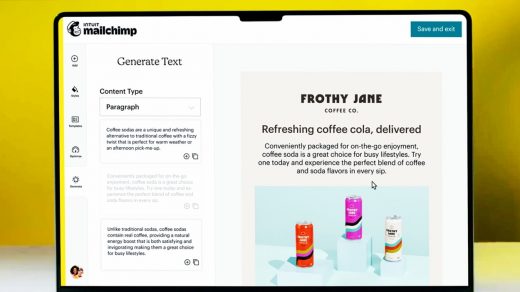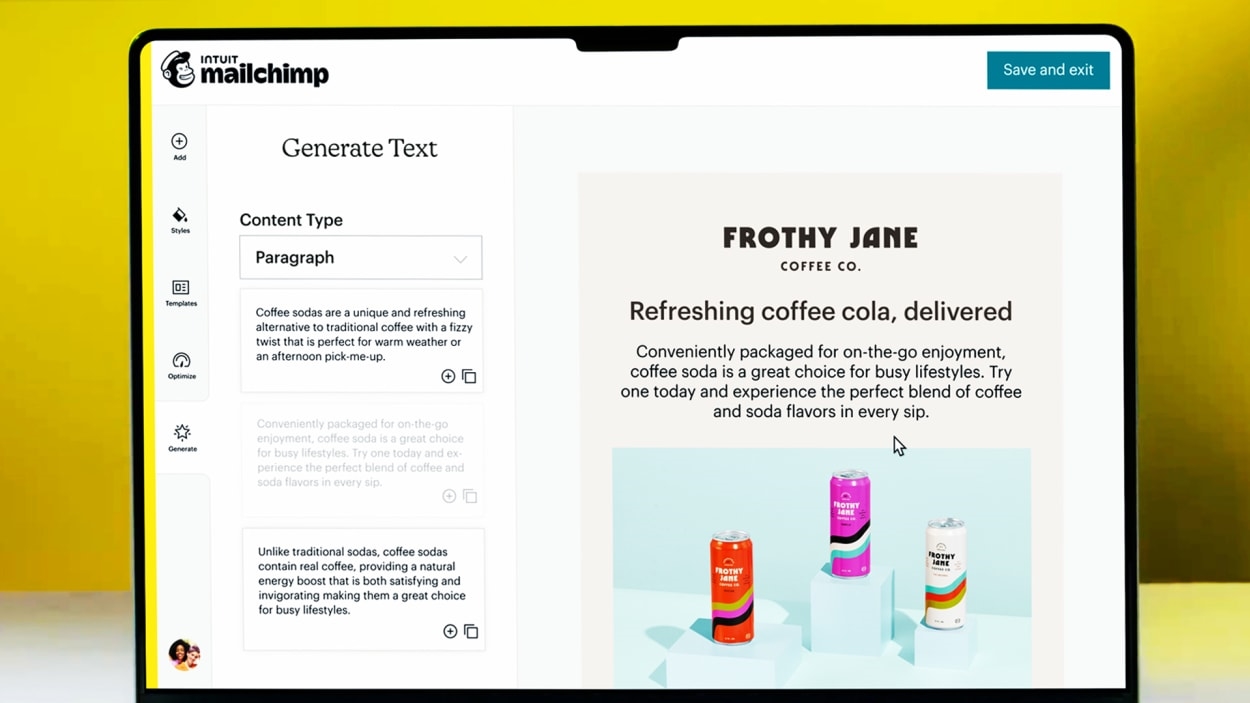Mailchimp’s new GPT-powered AI tool can write marketing emails
Crafting marketing email can be a drain on time and money for businesses, whether the owners are generating the content themselves or outsourcing to another firm.
For companies that send email through Mailchimp, there’s now a third option: letting AI generate any marketing missives. On Monday the company announced the beta launch of a tool called Email Content Generator, which uses OpenAI’s GPT technology to create marketing copy that users can drag and drop into emails they’re sending to existing and prospective customers.
The tool, available in beta to some U.S. users of Mailchimp’s standard and premium plans, is designed to strongly encourage Mailchimp users to review the machine-generated copy for accuracy and appropriateness: After all, GPT and other generative AI systems are known to sometimes make mistakes and even generate bizarre outputs. But Mailchimp, which was acquired in 2021 by Intuit, is optimistic that AI-driven content is the future of marketing email.
“Where we’re really excited about is proving at scale that we can generate emails that are higher performing than customers can generate themselves,” says Jon Fasoli, Mailchimp’s chief design and product officer. “This is a really exciting moment where we’ll show that we can achieve that milestone.”
Email Content Generator can suggest text based on the industry, the purpose of the email campaign, and a sample of past marketing materials (to give a sense of writing tone). Users can also give more detailed prompts to the AI system—“Write an email about our new product launch and offer 15% off orders today only,” the company gives as an example—and even specify desired emotional tones, from love and belonging to sadness and urgency.
If users aren’t satisfied with what the system generates, they can ask it to rewrite messages or, of course, they can edit the copy themselves. But Fasoli anticipates that the system will be fluent enough to save users time, which could enable them to produce more variations of their messages to send to more specific customer segments, something that’s naturally a chore to do strictly by hand.
“I’ve never met a marketer who deeply enjoys producing 100 different variants of content,” he says. “I hope that time savings allows for our marketers to really get creative around their strategy.”
The company, which itself acquired AI marketing platform Inspector 6 in 2020 and graphic design automation startup Sawa in 2019, has already rolled out AI-enabled tools to assist users in crafting email subject lines, which Fasoli says has generated “significant lift” in AI performance. Mailchimp’s AI can also automatically scan images included in emails to generate alt text to describe them. (Alt text is used by screen reader software and in situations where images can’t load.)
“We have quite a history of building these AI features in this product,” Mailchimp CEO Rania Succar tells Fast Company.
For years Mailchimp has pushed to be essentially a one-stop digital marketing shop for small businesses, letting them manage email, social media marketing, websites, and even physical postcard campaigns from one platform, bundled with predictive analytics to guide them in deciding which customers to target with what sort of messages and when. As with those technologies, the company aims to make generative AI more practical and efficient for marketers, including those who may have already been curious about tools like OpenAI’s ChatGPT, to integrate AI into their workflows.
“A lot of them think it’s cool and they’ve played around with it,” Succar says of AI. “But to actually adopt it takes work for them.”
Succar, an Intuit veteran who took the helm after cofounder Ben Chestnut somewhat suddenly vacated the CEO role last year, also emphasizes that users can now share data between Mailchimp and QuickBooks, Intuit’s popular small-business accounting program. That enables users to, say, target emails based on customer order records found in QuickBooks, or pick items to highlight in marketing emails based on inventory data from the platform.
And harnessing AI to craft the messages can potentially make highly customized email marketing that much more practical. “This will enable what we’re calling personalization at scale,” Succar says.
(29)



